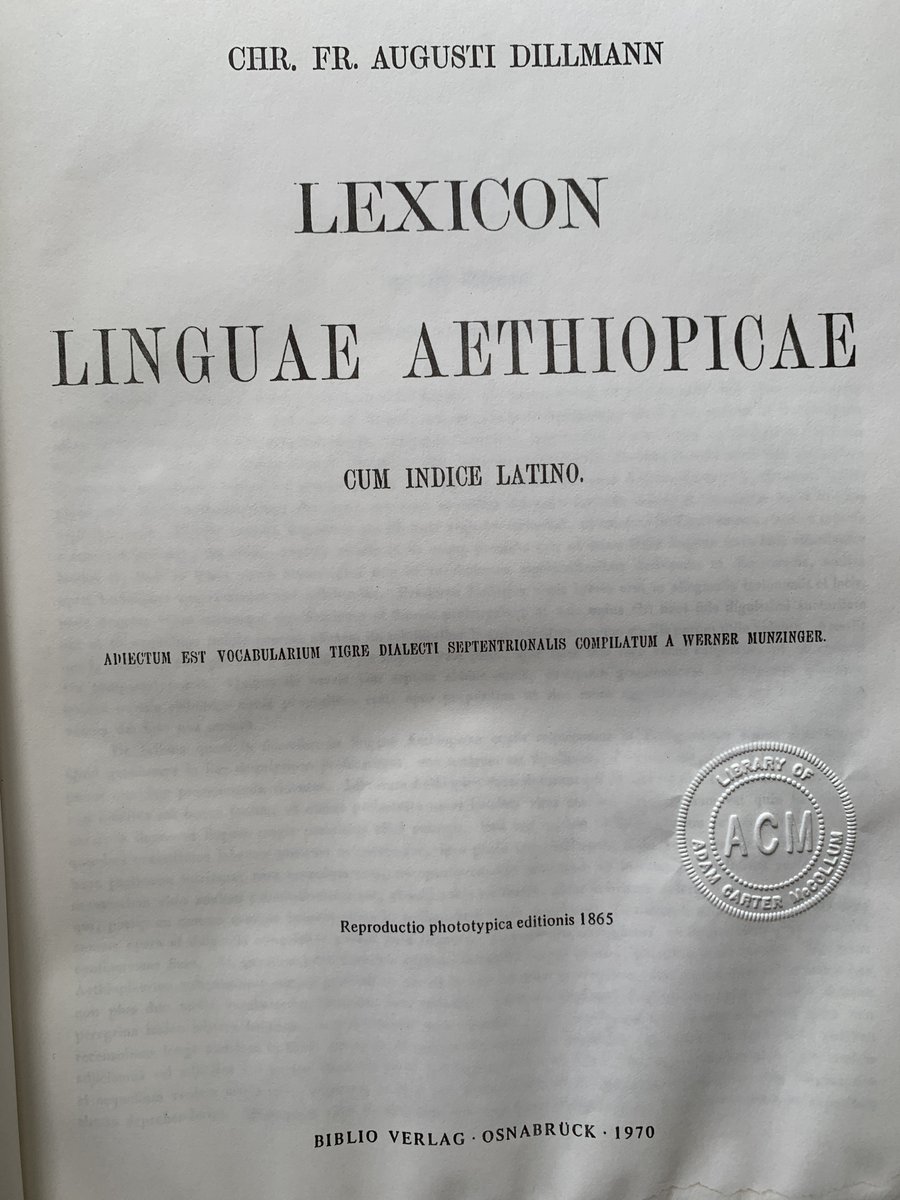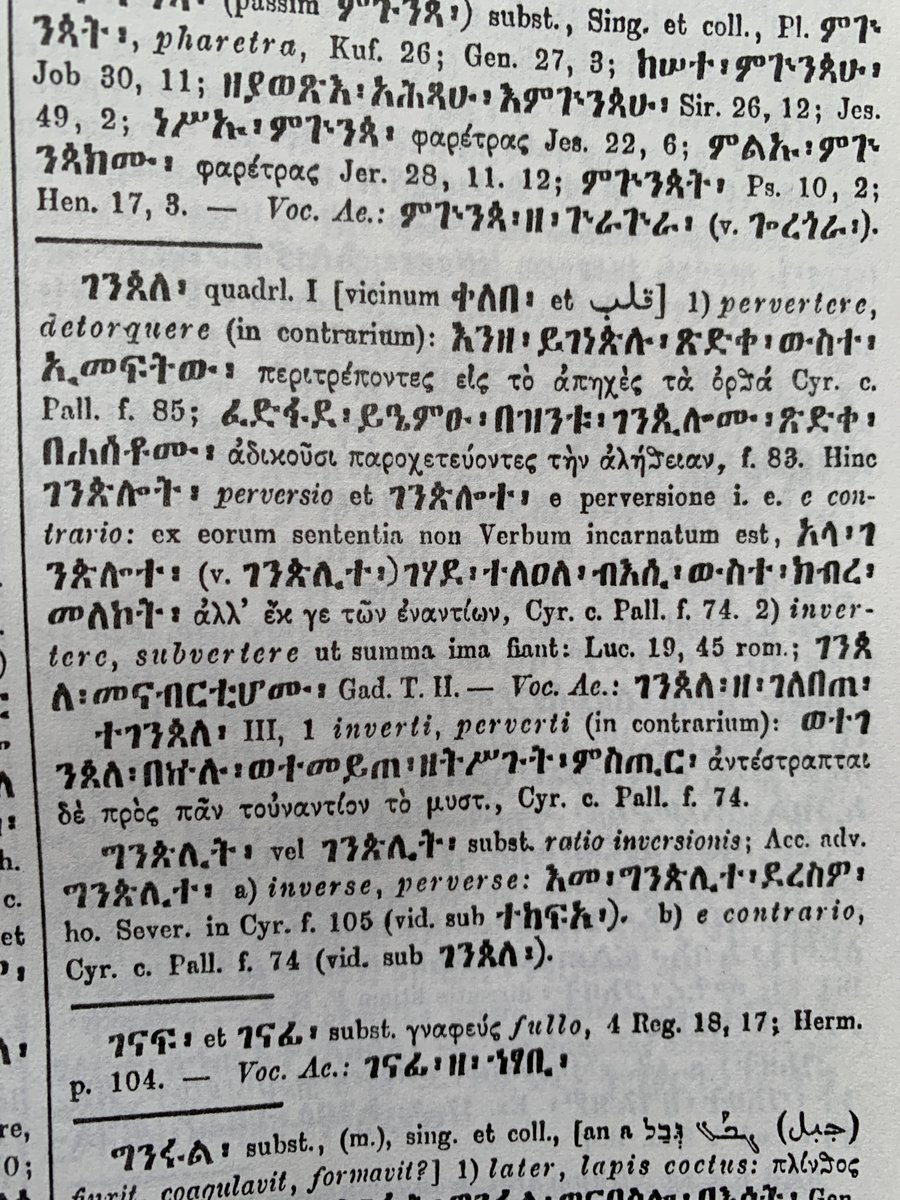
for any Gǝʕǝz learners, past, present, or future,
a short thread on three common dictionaries!
#Gǝʕǝz #learnGǝʕǝz #Gǝʕǝzlexicography
/
a short thread on three common dictionaries!
#Gǝʕǝz #learnGǝʕǝz #Gǝʕǝzlexicography
/
the 1st major dict. of Gǝʕǝz was published in Leipzig in 1865, by August Dillmann (1823-1894), who had already prepared Gǝʕǝz manuscript catalogs, text editions (incl. Enoch & Jub), a ref. grammar (& a chrestomathy afterward): Lexicon linguae Aethiopicae
/
/
Dillmann's lexicon is along the lines of other big lexical productions around the 2nd half of the 19th cent. like LSJ (1843), Payne Smith (1868-1901), Lewis & Short (1879), Bosworth (1882), Monier-Williams (1899), and BDB (1906)
/
/
some details on Dillmann's lexicon:
1392 columns
arranged by root
Gǝʕǝz text completely in Ethiopic script
etymological info
definitions in Latin
lots of citations
Latin index
/
1392 columns
arranged by root
Gǝʕǝz text completely in Ethiopic script
etymological info
definitions in Latin
lots of citations
Latin index
/
the dictionary is over 150 years old, but it's often still worth a look when things are otherwise unclear, or just for fun
/
/
as cool as a hard copy is, there's a searchable electronic version of Dillmann's lexicon is available here betamasaheft.eu/Dillmann/
/
/
Wolf Leslau (1906-2006), a major contributor to the study of Ethiopian languages — among numerous books & articles, e.g. his Etymological Dictionary of Harari (1963), intro (1995) and reference (2000) grammars of Amharic — is responsible for 2 more recent dictionaries:
/
/
first, the Comparative Dictionary of Geʿez (1987)
647 pp
arr. by root, ≈ Latin script order
Gǝʕǝz text only in translit., except the main lemma also in Ethiopic script
lots of etymological info (Sem, spec. Ethiosemitic, & otherwise)
Eng definitions
no citations
Eng index
/

647 pp
arr. by root, ≈ Latin script order
Gǝʕǝz text only in translit., except the main lemma also in Ethiopic script
lots of etymological info (Sem, spec. Ethiosemitic, & otherwise)
Eng definitions
no citations
Eng index
/


Leslau's other dictionary is his Concise Dictionary of Geʿez (1989)
247 pages
arranged by root, in the Ethiopic order
Gǝʕǝz text in Ethiopic script + translit. throughout
no etymological info
definitions in Eng
no citations
no index
/

247 pages
arranged by root, in the Ethiopic order
Gǝʕǝz text in Ethiopic script + translit. throughout
no etymological info
definitions in Eng
no citations
no index
/


the English definitions in both of Leslau's dictionaries are not especially detailed, and there isn't a single text reference, but they work well enough with some creativity and/or a thesaurus
/
/
all three dictionaries, spanning 135 years, serve different needs and users, and you may find one more helpful than others depending on set & setting: try 'em & see! 📚 happy reading!
/end ✌️
/end ✌️
• • •
Missing some Tweet in this thread? You can try to
force a refresh






